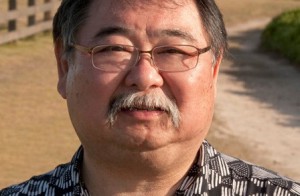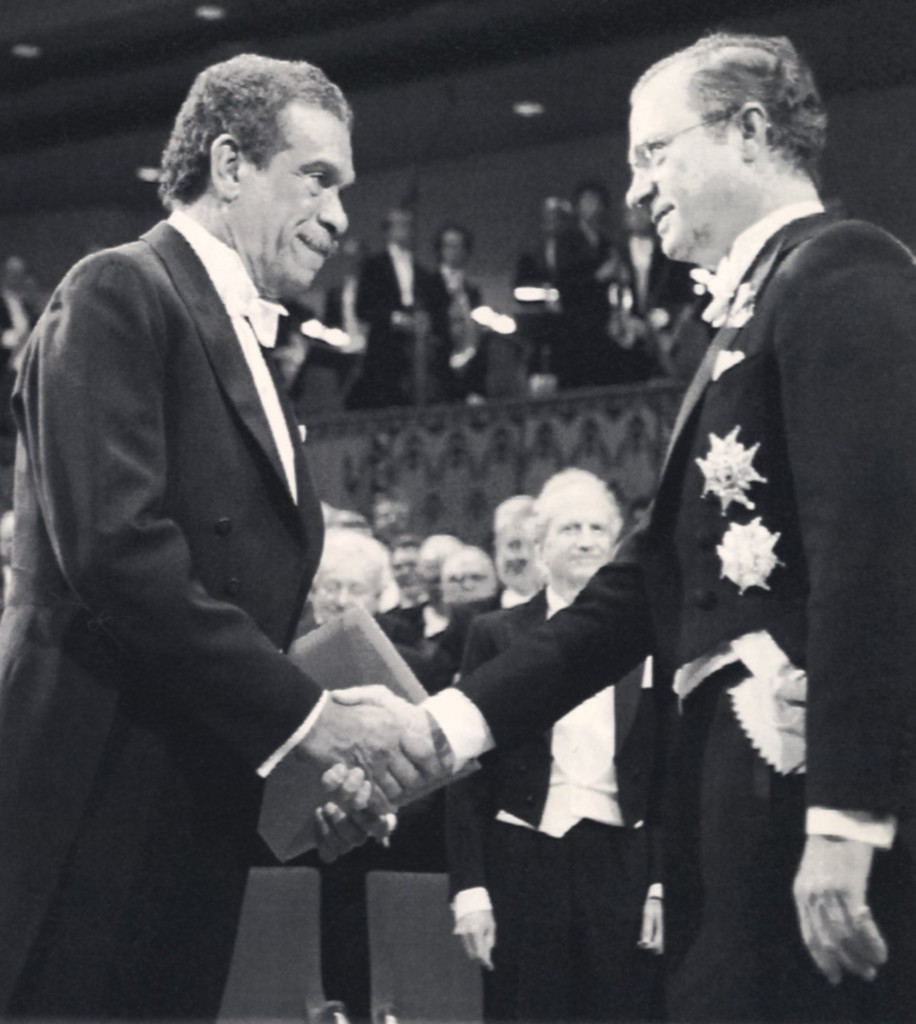
Shakespearean energy and scale
A few weeks ago, when I met Robert Pinsky for a quick coffee on San Francisco’s North Beach, he passed on the sad news that Nobel poet Derek Walcott wasn’t doing well, and to expect the bad news soon. And so I did, all the more when a Facebook friend, in touch with Walcott’s daughter, said the poet had slipped into a coma some days ago. He died today at 87.
The official cause of death has not been cited, but I’m pretty certain the poet died in the place, if not the way, he would have wished: on his native St. Lucia in the Caribbean, the sea that was the lifelong inspiration for his poems and plays. “I go back to St. Lucia and the exhilaration I feel is not simply the exhilaration of homecoming and of nostalgia,” he once said. “It is almost an irritation of feeling: Well, you never got it right. Now you have another chance. Maybe you can try and look harder.”
He was born on the island, and attended the newly established University College of the West Indies in Jamaica. After graduating in 1953 he moved to Trinidad. He was awarded the Nobel in 1992. He is best remembered for his epic poem Omeros. The Caribbean’s brutal colonial history, as well as the native beauty of these islands, were his themes.
“He’s a titan.” That was from Garrett Hongo, another islander from another ocean, the Pacific: a Japanese-American poet from Hawaii. He continued: “I’m weeping quietly and slowly. I cannot even begin to think of all the ways he has inspired me at different times in my life since I was a boy in an audience of a theater weeping at hearing his words in the dark, stage rain glittering down on the floorboards in front of me.”
“He was kind and encouraging to me when I was starting out. And he once called out my name as I stood in an autograph line, waiting with others. He said something to me I will never forget.” What did he say? “It was praise, I’ll just say that.”

Another island poet remembers.
Garrett had hoped to travel to St. Lucia in February for his birthday but was told he was ill and would not be seeing any visitors this year. He thought to present the essay that was a tribute to him, which had been presented at the Folk Center on St. Lucia. It didn’t happen. “He mana’o he aloha,” [I have a feeling of love] he said, in tribute.
According to NPR, when Walcott was teaching at Boston University 1984, he said that a book-length poem like Midsummer was a natural extension of the language all around him. “You would get some fantastic syntactical phenomena,” he said in an interview, “You would hear people talking in Barbados in the exact melody as a minor character in Shakespeare. Because here you have a thing that was not immured and preserved and mummified, but a voluble language, very active, very swift, very sharp. And that is going on still in all the languages of the Caribbean. So that you didn’t make yourself a poet — you entered a situation in which there was poetry.”
Walcott continued his project to make the western canon his own, summoning up the spirits of Shakespeare, Wordsworth, Yeats and Eliot in collections that explored his position “between the Greek and African pantheon”. His decision to write mostly in standard English brought attacks from the Black Power movement in the 1970s, which Walcott answered in the voice of a mulatto sea-dog in The Star-Apple Kingdom: “I have no nation now but the imagination./ After the white man, the niggers didn’t want me/ when the power swing to their side./ The first chain my hands and apologize, ‘History’ / the next said I wasn’t black enough for their pride.” While Omeros tackled the ghost of Homer head on, relocating Achilles, Helen and Philoctetes among the island fishermen of the West Indies.

Accepting the Nobel from King Carl Gustav
In 2012, he told The Guardian that he felt that he was still defined as a black writer in the US and the UK. “It’s a little ridiculous. The division of black theatre and white theatre still goes on, and I don’t wish to be a part of any one of those definitions. I’m a Caribbean writer.”
We’ve quoted Dana Goia, California poet laureate and former chairman of the embattled National Endowment of the Arts, a lot in the last few days. Let us do so once more. This afternoon he said: “Derek Walcott was justly celebrated as the historic figure who entered the great tradition of English-language poetry with his Caribbean identity intact, thereby both enriching and transforming the canon. It’s less known what a superb playwright Walcott was. His theatrical legacy is in every way equal to his poetry. Foremost among his dramatic achievements was his reinvention of contemporary verse drama in plays bristling with Shakespearean energy.”
I had the same thought when reviewing his verse plays, The Haitian Trilogy fifteen years ago for The San Francisco Chronicle. I wrote that Walcott was attempting to re-create West Indian history on a canvas as large and mythic as Shakespeare’s War of the Roses:
Commenting about his plays to the Caribbean Quarterly in 1968, Walcott said, “I hope that there is a moment, or there are moments, when the thing becomes a poetry on stage; and I would prefer to eventually write a play which would be a poem.”
If so, Walcott has hit the target. “The Haitian Trilogy is like the great hull of a lost ship, its crushed timber shot through with starlight. And what lies at the bottom of the seas it once sailed is the inevitability of time, the inevitability of history to crush kings and the certitude of conquerors, the inevitability of remorse for things done and undone – and, as always, the ability of gold to betray men.”
Godspeed, Mr. Walcott. Requiescat in pace.
Postscript on 3/18: Courtesy Elizabeth Amrien, we have a 52-minute podcast with Derek Walcott at Boston University, on the theme “Poetry and Politics.” Irena Grudzinska Gross moderates. It’s here.
Tags: "Dana Gioia", Derek Walcott, Garrett Hongo


March 18th, 2017 at 8:48 am
I’ve always thought folks from the CarIbbean spoke in poetry. Walcott confirmed it